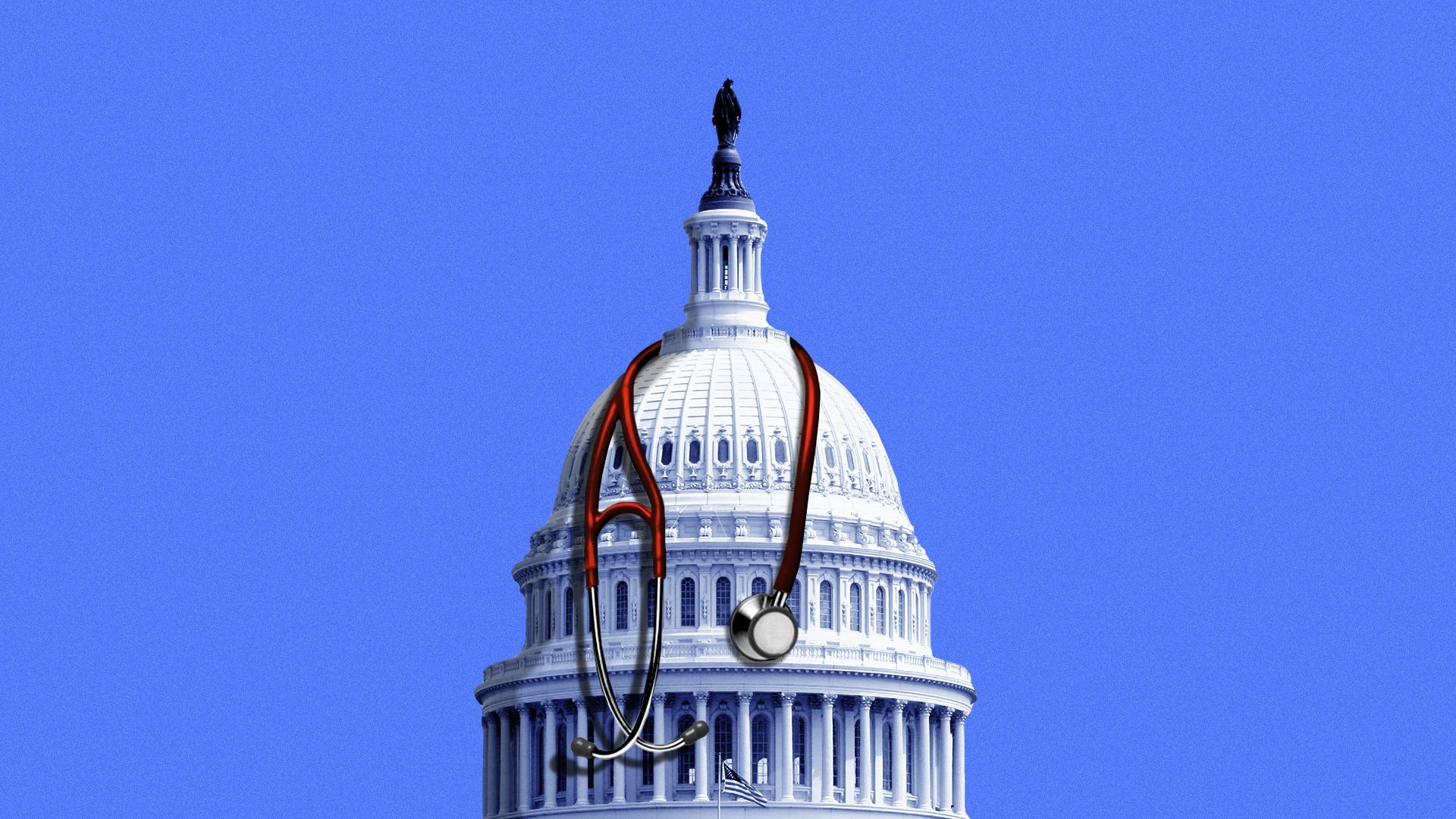| |
| |
| |
| Presented By PhRMA |
| |
| Axios Vitals |
| By Tina Reed · Jul 07, 2022 |
| Good morning, Vitals readers. Today's newsletter is 994 words, a 4-minute read. 🐕 1 fun thing to start your day: We've talked about biobanks for humans here at Vitals before. But today, Axios' Jennifer Kingson brings us a story about a massive effort by Mars Petcare — yes, part of the conglomerate that makes Mars candy — to create a biobank specifically for dogs and cats. |
| |
| |
| 1 big thing: Dems revisit drug price negotiations |
 |
|
| Illustration: Sarah Grillo/Axios |
| |
| Democrats are trying again to enact government price negotiations for prescription drugs, with a revised plan that would be wrapped into a broader reconciliation bill, Axios' Adriel Bettelheim writes. State of play: Senate Majority Leader Chuck Schumer on Wednesday released updated drug pricing language for review by the chamber's rules referee, with a goal of passing it through the partisan reconciliation process. - Schumer has been engaged in talks with Sen. Joe Manchin (D-W.Va.) on a package that would let Medicare negotiate directly with drugmakers over the price of prescription drugs
Details: According to a summary of drug pricing provisions obtained by Axios, negotiations would begin next year with prices to take effect in 2026. - The revised draft would require Medicare to use its new negotiating power for as many drugs as possible — a change from earlier drafts that gave the department some flexibility to back off.
- The deal would overhaul Medicare's Part D drug benefit starting in 2025 and cap annual premium growth at 6% through 2029.
- Drug companies would have to rebate the difference if they raise Part D drug prices higher than inflation, starting in October.
What they're saying: "This reform would help make sure when companies profit they do it because they are innovating and serving their customers, not hiring the best lawyers and lobbyists," said Frederick Isasi, executive director of Families USA, a nonprofit health care advocacy organization The other side: Drugmakers decried the plan as misguided. - "The prescription drug bill released today went from bad to worse for patients," said Debra DeShong, a spokesperson for PhRMA, a powerful lobby for the pharmaceutical industry.
Go deeper. |
    |
| |
| |
| 2. Tobacco ban flip-flops |
 |
|
| Photo: Phil Inglis/Getty Images |
| |
| A federal judge blocked an FDA plan to regulate premium cigars on Tuesday, saying the agency ignored evidence when it placed them under the same rules as other tobacco products. Why it matters: It marks the latest legal hurdle to the Biden administration's disjointed efforts to rein in tobacco use in the U.S., including a goal to cap nicotine in cigarettes and ban menthol cigarettes. State of play: It comes just two weeks after a federal appeals court temporarily blocked the FDA's order for Juul to stop selling e-cigarettes. What they're saying: "The family-owned manufacturers and retailers that make and sell premium cigars have long believed the FDA mishandled its decision to regulate premium cigars," Michael Edney of Steptoe & Johnson, a lawyer for the plaintiffs, told Reuters. - "FDA is committed to promptly completing review of the scientific issues identified that are unique to this application," a spokesperson said in a statement referring to Juul.
|
    |
| |
| |
| 3. Worse outcomes for young Black leukemia patients |
 |
|
| Illustration: Natalie Peeples/Axios |
| |
| Younger Black leukemia patients were likelier to die early or not go into complete remission than their white peers when receiving the same intensive treatment, Axios' Arielle Dreher reports about a new study in Blood Advances. Why it matters: The findings suggest race may factor into survival from acute myeloid leukemia and that a one-size-fits-all approach that includes chemotherapy may not be optimal for some. Details: The study used patient data from clinical trial and oncology study groups from 1983 to 2016 to compare genomic profiles of cancer patients as well as their outcomes. - Black patients aged 18 to 29 with acute myeloid leukemia had a higher early death rate, lower complete remission rate and decreased overall survival compared to white patients the same age who received the same treatment.
- Typically, AML is a cancer found in older people, and the findings challenged long-held assumptions that most younger people diagnosed with blood cancer do well with treatment and survive more often.
- "We were pretty astounded to see the outcomes were substantially different," Karilyn Larkin, a study author from Ohio State University, told Axios.
|
    |
| |
| |
| A message from PhRMA |
| Tell Congress savings belong to patients — not insurers' PBMs |
| |
 |
| |
| Did you know that only three insurance company PBMs control 80% of the prescription drug market? Here's why: They use their market power to get tens of billions in rebates and discounts that should be going to patients. Those savings belong to patients. |
| |
| |
| 4. FDA allows pharmacists to prescribe Paxlovid |
 |
|
| Photo: Europa Press/C.Lujan-Pool via Getty Images |
| |
| The FDA said Wednesday it's allowing state-authorized pharmacists to prescribe Pfizer's antiviral treatment Paxlovid for COVID patients, Axios' Oriana Gonzalez writes. Driving the news: It's a win for pharmacies, which had been pushing for the FDA to allow them to prescribe the medication, saying it would ultimately expand access to the antivirals. - "Removing barriers to pharmacist prescribing of oral antivirals has the potential to be a game-changer for addressing health equity and providing timely access to these life-saving treatments in pockets of the country where pharmacists may be the only health care provider for miles," said Ilisa Bernstein, interim CEO of the American Pharmacists Association, in a statement.
State of play: In the U.S., Paxlovid is authorized for people who have mild-to-moderate symptoms but are at high risk of severe illness. But it previously had to be prescribed by doctors. - The FDA revised its emergency use authorization to allow pharmacists to prescribe the medication within limits. Patients must test positive for the virus and show health records for a pharmacist to review for kidney or liver problems.
- Since Paxlovid must be taken within five days after symptoms present, officials said this will help more individuals access the drug in time.
- But the nation's biggest doctors group, the American Medical Association, said patients will get the best and most comprehensive care from physician-led teams.
Yes, but: This comes as a number of new studies raise the specter of COVID mutations that will allow the virus to elude the drug, Science reported recently. - "Given the amount of infections out there, it's going to come," David Ho, a virologist at Columbia University, told Science.
|
    |
| |
| |
| 5. Catch up quick |
| 💻 North Korea government-sponsored hackers have been targeting health care and public health organizations with a particular form of ransomware for the past year, the FBI, CISA and the Department of Treasury said on Wednesday. (Advisory) 👎 Almost 6 in 10 adults disapprove of the Supreme Court's decision overturning Roe v. Wade and other precedents establishing a federal right to an abortion, according to a recent survey from the Pew Research Center. (Axios) 🍼 The FDA plans to help overseas baby formula makers continue to market and sell their products in the U.S., even after the current shortage eases. (WSJ) |
    |
| |
| |
| A message from PhRMA |
| Tell Congress savings belong to patients — not insurers' PBMs |
| |
 |
| |
| Did you know that only three insurance company PBMs control 80% of the prescription drug market? Here's why: They use their market power to get tens of billions in rebates and discounts that should be going to patients. Those savings belong to patients. |
| |
 | | Why stop here? Let's go Pro. | | |








No comments:
Post a Comment